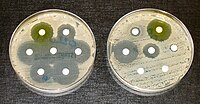
Photo from wikipedia
Necrotic enteritis (NE), caused by Clostridium perfringens, is an emerging issue in poultry farming. New approaches, other than antibiotics, are necessary to prevent NE development and the emergence of multidrug-resistant… Click to show full abstract
Necrotic enteritis (NE), caused by Clostridium perfringens, is an emerging issue in poultry farming. New approaches, other than antibiotics, are necessary to prevent NE development and the emergence of multidrug-resistant bacteria. Enterococci are commensal microorganisms that can produce enterocins, antimicrobial peptides with activities against pathogens, and could be excellent candidates for protective cultures. This study aimed to screen and characterize Enterococcus strains of poultry origin for their inhibitory activity against C. perfringens. In total, 251 Enterococcus strains of poultry origin plus five bacteriocin-producing (BP+) E. durans strains of other origins were screened for antimicrobial activity against the indicator C. perfringens X2967 strain using the “spot on the lawn” method. We detected thirty-two BP+ strains (eleven Enterococcus faecium, nine E. gallinarum, eight E. faecalis, three E. durans, and one E. casseliflavus). We further studied the antimicrobial activity of the supernatants of these 32 BP+ strains using agar well diffusion and microtitration against a collection of 20 C. perfringens strains. Twelve BP+ enterococci that were found to exhibit antimicrobial activity against C. perfringens were characterized using whole genome sequencing. Among these, E. faecium X2893 and X2906 were the most promising candidates for further studies as protective cultures for poultry farming. Both strains belong to the sequence type ST722, harbor the genes encoding for enterocin A and enterocin B, do not possess acquired resistance genes, do not carry plasmids, and present the acm gene, which is implicated in host colonization. Further research is needed to determine the utility of these strains as protective cultures.
Journal Title: Antibiotics
Year Published: 2023
Link to full text (if available)
Share on Social Media: Sign Up to like & get
recommendations!